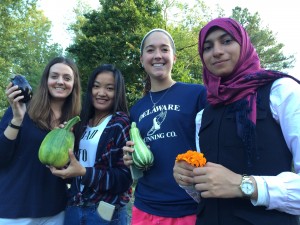Skip to content

With initial funding from the Campus Sustainability Fund, the Garden at ELI began in 2010 as a partnership between a graduate student organization (Food and Garden Policy Committee- FGPC) and the English Language Institute. UD graduate and undergraduate students and interested international students studying at the ELI have worked together to grow the garden since then.

The ELI garden is so called because it is located on the land behind the English Language Institute (ELI) at 189 West Main Street, Newark, DE. The UD students and faculty at the College of Agriculture and Natural Resources(CANR) work together with the ELI to share the garden for various purposes, and to engender community among UD affiliates who have an interest in organic gardening, good health, and food security for the local and global community.
Past and current projects have included the following:
– Community Garden beds for private use
– A CSA program
– Workshops and Presentations on Organic Gardening and Foods
– Service Learning Gardening for the Food Bank
– English Language Instruction thru Gardening
– A Garden Recipe Book Project
– Periodic Garden Harvest Meals and gatherings

The original mission of the garden has been to promote sustainable organic gardening on campus. The ELI’s purpose in collaboration with garden stakeholders is to facilitate the potential for the garden as a resource for English language instruction and cultural integration of our international students at UD.

FPGC Mission Statement:
To increase the incidence and visibility of organic food gardening on campus
To promote/support organic food gardening education
To promote sustainable campus food policy
To foster active participation in food gardening activities on campus
ELI Garden Committee Mission Statement:
To keep the ELI community informed about garden events and activities
To develop/implement garden related service learning opportunities for ELI students
To facilitate language interaction opportunities between ELI students and UD community garden participants
To explore ways to make effective use of the ELI garden as a resource for language learning.





